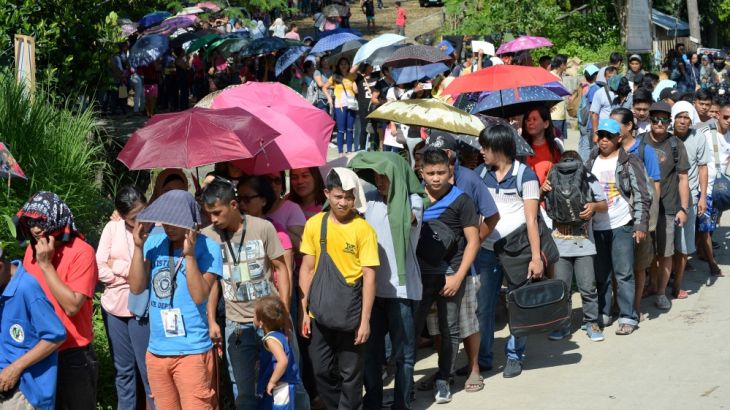Philippines: Hundreds trapped in battle for Marawi
Philippine army makes gains as alarm grows over fate of up to 2,000 people stranded amid street battles and air strikes.

Philippine forces say they now control most of a southern city where fighters linked to ISIL launched a bloody siege a week ago, as fears grow for hundreds of people unable to escape the violence.
Reports on Monday said that 24 civilians were among the 105 killed in the fighting between the military and fighters of the Maute armed group.
Keep reading
list of 4 itemsAustin confirms Russians deployed to airbase housing US military in Niger
What’s next as ‘heavy-handed’ US negotiates pullout from Niger?
Putin says ‘radical Islamists’ behind Moscow concert hall attack
Most of Marawi’s 200,000 people have left the city but up to 2,000 people were stranded in areas controlled by Maute fighters, according to Zia Alonto Adiong, a politician coordinating efforts to evacuate civilians.
“They are texting us and calling us for help,” he said.
“They can’t leave because they are afraid of running into checkpoints put up by the gunmen.”
READ MORE: Mindanao crisis – A city on fire
The trapped civilians were without food, and wanted the military to stop air strikes, he said, urging the military “to do a different approach”.
Street-to-street battles and a relentless bombing campaign has so far failed to end the crisis in Marawi, one of the biggest Muslim cities in the Philippines, where President Rodrigo Duterte claims Muslim fighters were involved in an ISIL-inspired effort to set up a separate state.
Duterte has imposed martial law across the southern third of the Philippines to end the uprising.
Pockets of resistance
Only small areas were under the control of fighters on Monday, military spokesman Brigadier-General Restituto Padilla said.
“We can control who comes in and who comes out, who moves around and who doesn’t, and we are trying to isolate these pockets of resistance that have remained,” he told the AP news agency.
When asked about fears of civilians being bombed, Padilla told reporters that air strikes would be done with precision, but said bombings would continue in whichever areas the fighters were hiding.
![The army said only a few areas are under Maute control after a week of fighting [Erik De Castro/Reuters]](/wp-content/uploads/2017/05/f88e515b4f7e48f9a9e4a4b1b1e2dd0b_18.jpeg)
Philippine National Police Chief Ronald de la Rosa said the operation was taking time because Marawi is urban, allowing gunmen to move quickly from building to building to evade capture.
“I cannot give operational details, but I am sure they are also human, they will get tired,” he said.
READ MORE: Duterte makes rape ‘joke’ for martial law troops
According to the latest government figures, 24 civilians, 61 fighters and 20 soldiers have been killed since violence broke out on Tuesday.
Myrna Bandung, a Catholic woman, told reporters at a checkpoint on Monday that she had been with a group of eight men when they were gunned down on Sunday.
“They did not kill me because I was able to recite a Muslim prayer. The others were not so lucky,” Bandung, who was visibly shocked, said.
A paper sign attached to one of the men indicated that the victims had “betrayed their faith,” the police said. Their bodies were found in a ravine outside Marawi.
Bodies of four men, three women and a child were also found near a road close to the Mindanao State University in Marawi.
|
|
Lockdown
The city of Illigan, some 38 km away from Marawi, was meanwhile overflowing with evacuees and on lockdown, with authorities saying they were worried that Maute fighters were blending in with the displaced and could launch attacks.
“We don’t want what’s happening in Marawi to spill over in Iligan,” Colonel Alex Aduca told a local radio station.
“We want to ensure the safety of people here, to prevent elements from entering and conducting terroristic activities.”
He said some rebels had been caught trying to get into Iligan, but did not give details.
The violence erupted last Tuesday night when the government launched a raid to capture Isnilon Hapilon, a veteran Filipino fighter regarded as the local leader of ISIL.
But the operation went awry and fighters rampaged through the city, torching buildings and battling government forces in the streets.
A priest and several worshippers were taken hostage. There was no word on their fate.
Hapilon, an Islamic preacher, was once a commander of the armed group Abu Sayyaf that pledged allegiance to the Islamic State of Iraq and the Levant (ISIL, also known as ISIS) in 2014.
He now heads an alliance of at least 10 smaller armed groups, including the Maute, which has a heavy presence in Marawi.
|
|